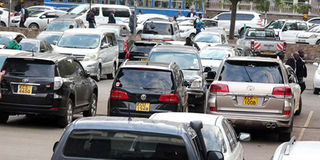Charging Nairobi drivers for parking won’t ease congestion

Parking spaces filled up in Nairobi's central business district on June 10, 2019. The county government wants to increase parking fees. PHOTO | FILE | NATION MEDIA GROUP
What you need to know:
- It appears both the county and national governments are unable to implement any plan to decongest the city without impoverishing its denizens further.
- The city managers should try more innovative ways to solve its numerous problems besides throwing hard-earned taxpayers’ money at them.
Motorists who have no choice but to park in Nairobi’s central business district must be relieved that the High Court suspended the new parking fees structure imposed by the city government.
The relief granted could be short-lived; it is possible that in the next month or so, Nairobi’s denizens will need to make the difficult decision whether to leave their cars at home and walk or use the abusive public means, or dig deeper into their already depleted pockets to pay for the luxury of driving to work.
As the matter is in court, it would hardly do to comment on its merits and demerits, but since this is an issue of immense public interest, there would be little prejudice in asking an obvious question: what is the rationale for county authorities to impose such a punitive charge without telling us how the money raised will be used to help them?
Those poor fellows do not drive to town for pleasure; they have to make a living.
OVERTAXED
Many motorists would prefer to leave their vehicles at home; driving in the mind-boggling chaos that has become the order of the day long ceased to be fun.
City motorists are not gluttons for punishment and they would do anything for peace of mind.
To achieve this, they wouldn’t even mind paying heavily for the privilege if only they had the money to spare – but they don’t.
Right now, it is difficult for every middle-class office worker who owns a jalopy to pay Sh2,000 a week for parking, especially if the car was acquired through a loan that has to be serviced, not to mention fuel prices which are always fluctuating in an upward trajectory.
But some people argue that if you can afford to buy and drive a car, you should be able to afford an extra Sh200 for parking.
This is balderdash. These people are already too heavily taxed and they don’t see where their money goes.
Early in the week, I chanced upon a highly amusing plea by the UN-Habitat Executive Director Maimunah Sharif for Kenyans to cycle or walk to work because it is not only a healthy habit, but also good for the environment.
DEATH WISH
Apparently, although the Habitat boss lives in Nairobi, she knows little about the city. Many do, indeed, walk to work, but not for health reasons – they simply cannot afford bus fare.
However, it is almost impossible to find anyone willing to cycle to work unless they live and work in up-market suburbs.
Kenyans may be poor, but they do not have a collective death wish. Has Ms Shariff ever tried to ride a bicycle on any of the roads leading to the city during rush hour? If she did, she would not be talking that way.
Granted, while pushing for the non-motorised traffic system, she did acknowledge that city-dwellers waste valuable time stuck in traffic.
To cure this, she urged the government to provide the necessary infrastructure – walkways, bicycle lanes and relevant signage – but she was wasting her breath.
Such relatively low-cost infrastructure projects are unattractive to policymakers for they do not provide enough opportunities for hefty kickbacks.
MORE REVENUE
I listened to the man in charge of county traffic management, Mr Tom Tinega, defend the hefty parking fee increases on TV.
Some of his arguments were fascinating. It appears his main concern was not how to decongest the city but how to raise more revenue.
He even advised motorists who may feel the pinch to park in outlying zones like Ngara, Kilimani or Westlands.
If only the good man would tell us where the unoccupied parking slots in Ngara, for instance, are located, I am sure everyone would be grateful.
There are reasons why authorities in highly-populated cities have managed to keep private motorists away from their CBDs by charging exorbitant fees.
It works very well in cities like London and Bonn because they have workable transport systems with subways, trams, trains, BRT and well-guarded parking areas in the suburbs.
Commuters see no reason to drive to work and they enjoy much healthier lifestyles.
ENFORCEMENT
Nobody knows how the High Court will rule on the matter of the parking fee increase on January 21, and it would be foolhardy to second-guess the verdict, but one thing is clear: the city government will have a hard time implementing it – at least in the public service sector, judging from the reaction of the Matatu Owners Association boss, one Mr Simon Kimutai.
It appears both the county and national governments are unable to implement any plan to decongest the city without impoverishing its denizens further.
The city managers should try more innovative ways to solve its numerous problems besides throwing hard-earned taxpayers’ money at them.
In the meantime, parking boss Tinega may consider donating his free parking slot to distressed motorists. No doubt the gesture will be highly appreciated.
Mr Ngwiri is a consultant editor. [email protected]





